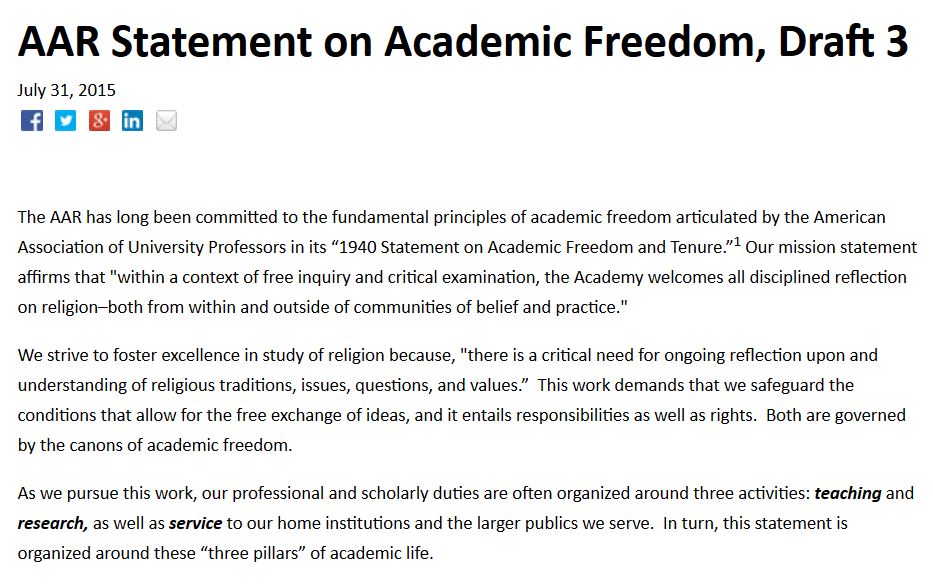 Are Muslims taking over India? Recently released data from the 2011 Census of India generated various headlines, from the alarmist assertion that the percentage of the population identifying as Hindu has declined to the calmer emphasis on the slowing growth in communities identified as Muslim. One Hindu nationalist organization provocatively asked in response to the data, “Is there a larger conspiracy to Islamise Bharat [India]?” These reactions to demographic shifts look familiar, like responses to demographic change in the US concerning religious affiliation or ethnic identity. Analyzing the dynamics underneath the numbers reveals that these instruments are not simply describing changes in our world but constructing our world in particular ways. Continue reading “When the Census Creates Fear”
Are Muslims taking over India? Recently released data from the 2011 Census of India generated various headlines, from the alarmist assertion that the percentage of the population identifying as Hindu has declined to the calmer emphasis on the slowing growth in communities identified as Muslim. One Hindu nationalist organization provocatively asked in response to the data, “Is there a larger conspiracy to Islamise Bharat [India]?” These reactions to demographic shifts look familiar, like responses to demographic change in the US concerning religious affiliation or ethnic identity. Analyzing the dynamics underneath the numbers reveals that these instruments are not simply describing changes in our world but constructing our world in particular ways. Continue reading “When the Census Creates Fear”
The Complete Inverse
 Have you seen that pic, or that article, making the rounds of social media? There seems to be a script problem on the source’s page but click the graphic if you want to try to find the article, concerning how the upcoming Supergirl series flies in the face of the stereotypes of male superheros — notably the recent “Man of Steel” depiction of Superman (all dark and brooding). Continue reading “The Complete Inverse”
Have you seen that pic, or that article, making the rounds of social media? There seems to be a script problem on the source’s page but click the graphic if you want to try to find the article, concerning how the upcoming Supergirl series flies in the face of the stereotypes of male superheros — notably the recent “Man of Steel” depiction of Superman (all dark and brooding). Continue reading “The Complete Inverse”
A Lesson in the Sociology of Luck
 Growing up in Canada, you were likely a hockey fan; no different than how baseball is the so-called American pastime, in the Canada where and when I grew up it was hockey. Living near Toronto, the odds were pretty good that you’d be a Toronto Maple Leafs fan. And back then, there weren’t too many teams in the league, so you probably felt a rivalry with pretty much everyone, since you were able to tell stories about pivotal wins and loses to each.
Growing up in Canada, you were likely a hockey fan; no different than how baseball is the so-called American pastime, in the Canada where and when I grew up it was hockey. Living near Toronto, the odds were pretty good that you’d be a Toronto Maple Leafs fan. And back then, there weren’t too many teams in the league, so you probably felt a rivalry with pretty much everyone, since you were able to tell stories about pivotal wins and loses to each.
And it was in that context that I disliked Phil Esposito. Continue reading “A Lesson in the Sociology of Luck”
Ironic Symmetry
 People tend to use historical narratives to construct the essence of a movement or symbol, but only when it is convenient. Case in point, a recent Washington Spectator article argues that the POW/MIA flag should be taken down because it was a cynical tool that the Nixon administration created to galvanize support for the Vietnam War. Soldiers who had previously been classified as “Killed in Action/Body Unrecovered” were suddenly identified as “Missing in Action” or potentially POWs whose life or remains must be recovered before leaving Vietnam. These efforts included exaggerating the numbers of soldiers as POWs or Missing in Action in the Vietnam War to justify, in part, continuing the war. Because of this narrative of the flag, the author asserts that it should be removed because of its negative origins in manipulative lies and violence, comparing it to the Confederate flag and its historical meaning. Continue reading “Ironic Symmetry”
People tend to use historical narratives to construct the essence of a movement or symbol, but only when it is convenient. Case in point, a recent Washington Spectator article argues that the POW/MIA flag should be taken down because it was a cynical tool that the Nixon administration created to galvanize support for the Vietnam War. Soldiers who had previously been classified as “Killed in Action/Body Unrecovered” were suddenly identified as “Missing in Action” or potentially POWs whose life or remains must be recovered before leaving Vietnam. These efforts included exaggerating the numbers of soldiers as POWs or Missing in Action in the Vietnam War to justify, in part, continuing the war. Because of this narrative of the flag, the author asserts that it should be removed because of its negative origins in manipulative lies and violence, comparing it to the Confederate flag and its historical meaning. Continue reading “Ironic Symmetry”
Immaterial Culture?
 I’ve recently written some posts, e.g., here, and here, along with an essay or two about the troubles I have with scholars who now study this thing they call material religion; my difficulty is the philosophically idealist stance that yet persists despite their supposed focus upon the empirical, the tangible. For, sooner or later, the other shoe will drop and you’ll see that the artifact they’re quite literally saying they’re looking at and touching or hearing, maybe even sniffing or tasting, is assumed by them to “embody” or “manifest” some prior, ahistorical, and thus ethereal thing; sure, they might no longer call it “the sacred” but you’ll usually find it called “meaning” instead; their work makes it plain that if it is studied at this one empirical site carefully enough then you’ll be able to infer things about it that transcend that particular instantiation.
I’ve recently written some posts, e.g., here, and here, along with an essay or two about the troubles I have with scholars who now study this thing they call material religion; my difficulty is the philosophically idealist stance that yet persists despite their supposed focus upon the empirical, the tangible. For, sooner or later, the other shoe will drop and you’ll see that the artifact they’re quite literally saying they’re looking at and touching or hearing, maybe even sniffing or tasting, is assumed by them to “embody” or “manifest” some prior, ahistorical, and thus ethereal thing; sure, they might no longer call it “the sacred” but you’ll usually find it called “meaning” instead; their work makes it plain that if it is studied at this one empirical site carefully enough then you’ll be able to infer things about it that transcend that particular instantiation.
Just as something is claimed to be “an example of French culture,” for instance. Continue reading “Immaterial Culture?”
Response to the American Academy of Religion’s Statement on Academic Freedom, Part 5

Recently, the Board of Directors of the American Academy of Religion released a draft update to its 2006 statement on Academic Freedom and the Teaching of Religion and solicited feedback from members. Given that the members of Culture on the Edge are all scholars of religion, some have opted to offer their feedback to the AAR via this short series of posts on our site. (An index to all the posts in this series can be found here)
Monica Miller
As a scholar on the “critical” side of many debates in the study of religion, I have a general frustration with the impact of religious institutional footprints, affiliations and ethical assumptions on the American Academy of Religion. The language of “…within and outside of communities of belief and practice” and talk of “…religious traditions, issues, questions, and values” in the recent proposed revisions on the AAR Statement on Academic Freedom comes as no surprise. Continue reading “Response to the American Academy of Religion’s Statement on Academic Freedom, Part 5”
Response to the American Academy of Religion’s Statement on Academic Freedom, Part 4
 Recently, the Board of Directors of the American Academy of Religion released a draft update to its 2006 statement on Academic Freedom and the Teaching of Religion and solicited feedback from members. Given that the members of Culture on the Edge are all scholars of religion, some have opted to offer their feedback to the AAR via this short series of posts on our site. (An index to all the posts in this series can be found here)
Recently, the Board of Directors of the American Academy of Religion released a draft update to its 2006 statement on Academic Freedom and the Teaching of Religion and solicited feedback from members. Given that the members of Culture on the Edge are all scholars of religion, some have opted to offer their feedback to the AAR via this short series of posts on our site. (An index to all the posts in this series can be found here)
Russell McCutcheon
Over the past few weeks I wrote a long series, posted at my Department’s own blog, in reply to another recently released draft document from the AAR, that one on research responsibilities. Since so much of this new draft is not actually on academic freedom at all (i.e., addressed to the institutional conditions that provide researchers and teachers with the necessary latitude to do their jobs) but, rather, on the scholar’s own duties and obligations to their students, the people with whom they work, and the people whom they study, it seems that much of what I wrote in that other series equally applies here. That is, the two documents are unnecessarily redundant (i.e., count how often you read the word “responsibility” in this academic freedom statement). So I’d prefer that readers, after looking through this new academic freedom statement, then work through my earlier posts on research responsibilities (notably, this one), to save me from being unnecessarily redundant here.
Oh, and as they do this, I’d suggest that readers also ask themselves why the Board is so focused on an individual’s obligations when they think about writing on academic freedom? It’s almost as if they can’t conceive of structure-wide analysis and opt, instead, to think merely of the lone individual as being in need of governance. Continue reading “Response to the American Academy of Religion’s Statement on Academic Freedom, Part 4”
Response to the American Academy of Religion’s Statement on Academic Freedom, Part 3
 Recently, the Board of Directors of the American Academy of Religion released a draft update to its 2006 statement on Academic Freedom and the Teaching of Religion and solicited feedback from members. Given that the members of Culture on the Edge are all scholars of religion, some have opted to offer their feedback to the AAR via this short series of posts on our site. (An index to all the posts in this series can be found here)
Recently, the Board of Directors of the American Academy of Religion released a draft update to its 2006 statement on Academic Freedom and the Teaching of Religion and solicited feedback from members. Given that the members of Culture on the Edge are all scholars of religion, some have opted to offer their feedback to the AAR via this short series of posts on our site. (An index to all the posts in this series can be found here)
Craig Martin
I’m extremely grateful to the AAR for including reference to the AAUP’s statement on collegiality; the requirement of collegiality and civility are potentially directly opposed to academic freedom. However, as Merinda Simmons noted earlier in this series, there appears to be a tension between those comments on collegiality and civility, on the one hand, and the recommendation that we be respectful, sensitive, patient, humble, and generous, on the other. The definitions of the former terms overlap largely with the definitions of the latter. Wikipedia—a good source of information about colloquial uses of words—reports that collegiality *involves respect* toward others. So we are to be respectful to others, but institutions cannot demand that we be respectful (i.e., collegial) toward others? Continue reading “Response to the American Academy of Religion’s Statement on Academic Freedom, Part 3”
Response to the American Academy of Religion’s Statement on Academic Freedom, Part 2
 Recently, the Board of Directors of the American Academy of Religion released a draft update to its 2006 statement on Academic Freedom and the Teaching of Religion and solicited feedback from members. Given that the members of Culture on the Edge are all scholars of religion, some have opted to offer their feedback to the AAR via this short series of posts on our site. (An index to all the posts in this series can be found here)
Recently, the Board of Directors of the American Academy of Religion released a draft update to its 2006 statement on Academic Freedom and the Teaching of Religion and solicited feedback from members. Given that the members of Culture on the Edge are all scholars of religion, some have opted to offer their feedback to the AAR via this short series of posts on our site. (An index to all the posts in this series can be found here)
Merinda Simmons
The AAR Statement on Academic Freedom reads as rhetorically and intellectually scattered at best. The terms it leaves undefined (like “responsible”, “unsettling”, “sensitive”, along with a host of others) are not done any favors by the contradictory passages that directly undercut each other. Take, for instance, a couple of sentences early on in the Research section: “Researchers have the right to follow lines of inquiry where they lead but also the responsibility to exercise care, recognizing that our discoveries may have implications for the self-understanding and well being of students, colleagues, and members of the public. Criticism should not impede judicious critical scholarship, and our shared commitment to free inquiry means that scholars must be free from intimidation and free to form conclusions on the basis of shared scholarly norms, as understood by qualified peers.” Continue reading “Response to the American Academy of Religion’s Statement on Academic Freedom, Part 2”
Response to the American Academy of Religion’s Statement on Academic Freedom, Part 1

Recently, the Board of Directors of the American Academy of Religion released a draft update to its 2006 statement on Academic Freedom and the Teaching of Religion and solicited feedback from members. Given that the members of Culture on the Edge are all scholars of religion, some have opted to offer their feedback to the AAR via this short series of posts on our site. (An index to all the posts in this series can be found here)
Steven Ramey
The revision of the AAR Statement on Academic Freedom inserts attitudinal terms, such as humility, patience, and generosity, into the revised document (compared to the 2006 version) and thus distracts from the case for academic freedom. While those attitudes are often useful in engaging students and colleagues, they are more appropriate for discussions of best practices than a delineation of academic freedom. The malleability of such terms (with no standard to judge them against except the standards of whomever wants to employ them) creates a problem similar to the language of “collegiality” that the revised statement itself critiques in the final section on service, noting the AAUP’s rejection of that ill-defined rationale for denial of tenure. Continue reading “Response to the American Academy of Religion’s Statement on Academic Freedom, Part 1”
